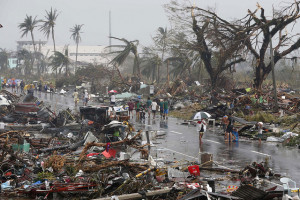
In yet another landmark legal case, the world’s largest fossil fuel, cement and mining companies have been given 45 days to respond to a complaint that they have violated the human rights of millions of people living in the Philippines due to their emissions of greenhouse gases.
The country, home to some 7,000 islands, is seen as one of the most vulnerable to climate change and has already suffered serious climate-related impacts such as super-typhoon Yolanda (see picture) which killed more than 6,000 people in 2013.
The Commission on Human Rights of the Philippines (CHR), a constitutional body in the country which investigates human rights violations, has sent 47 “carbon majors” including Exxon, Shell, BP, Chevron, ConocoPhillips and Total, a letter accusing them of breaching their fundamental rights. The complaint has been brought by Greenpeace and thirteen other campaign groups.
The 60 page document outlines how “The Carbon Majors should be held accountable for violations or threats of violations of Filipinos’ rights to life; to the highest attainable standard of physical and mental health; to food; to water; to sanitation; to adequate housing; and to self-determination resulting from the adverse impacts of climate change.”
The document adds: “Special attention should be paid to marginalized and disadvantaged people and communities particularly vulnerable to the effects of climate change, including women, children, persons with disabilities, those living in extreme poverty, indigenous peoples, and displaced persons; as well as the right of Filipinos to development.”
According to the Guardian “The move is the first step in what is expected to be an official investigation of the companies by the CHR, and the first of its kind in the world to be launched by a government body.”
The complaint outlines how one potential way to determine the level of responsibility of an individual “Carbon Major is by identifying the company’s share in the estimated global industrial emissions of carbon, and when it is supposed to have allegedly acquired knowledge of its products’ harmful effects, including the impacts on the climate, ecological balance, and people’s health, or was informed of those impacts”.
It also demands that the companies explain how “such violations or threats of violation resulting from the impacts of climate change will be eliminated, remedied, or prevented in the future.”
It also recommends that “governments, including the Philippines and other countries where the investor-owned Carbon Majors are domiciled and/or operate, enhance, strengthen, or explore new ways to fulfill the international duty of cooperation to ensure the Carbon Majors take steps to address the human rights implications of climate change.”
“The commission’s actions are unprecedented. For the first time, a national human rights body is officially taking steps to address the impacts of climate change on human rights and the responsibility of private actors,” said Zelda Soriano, a legal adviser for Greenpeace in Southeast Asia, one of the groups bringing the complaint to the CHR.
“Ultimately, those who have profited most from pumping carbon dioxide into the atmosphere must bear the burden of preventing the havoc already being wreaked by climate change,” added Greenpeace chief Jennifer Morgan. “This is the first step in that process.”
The full legal investigation is expected to start in October.
